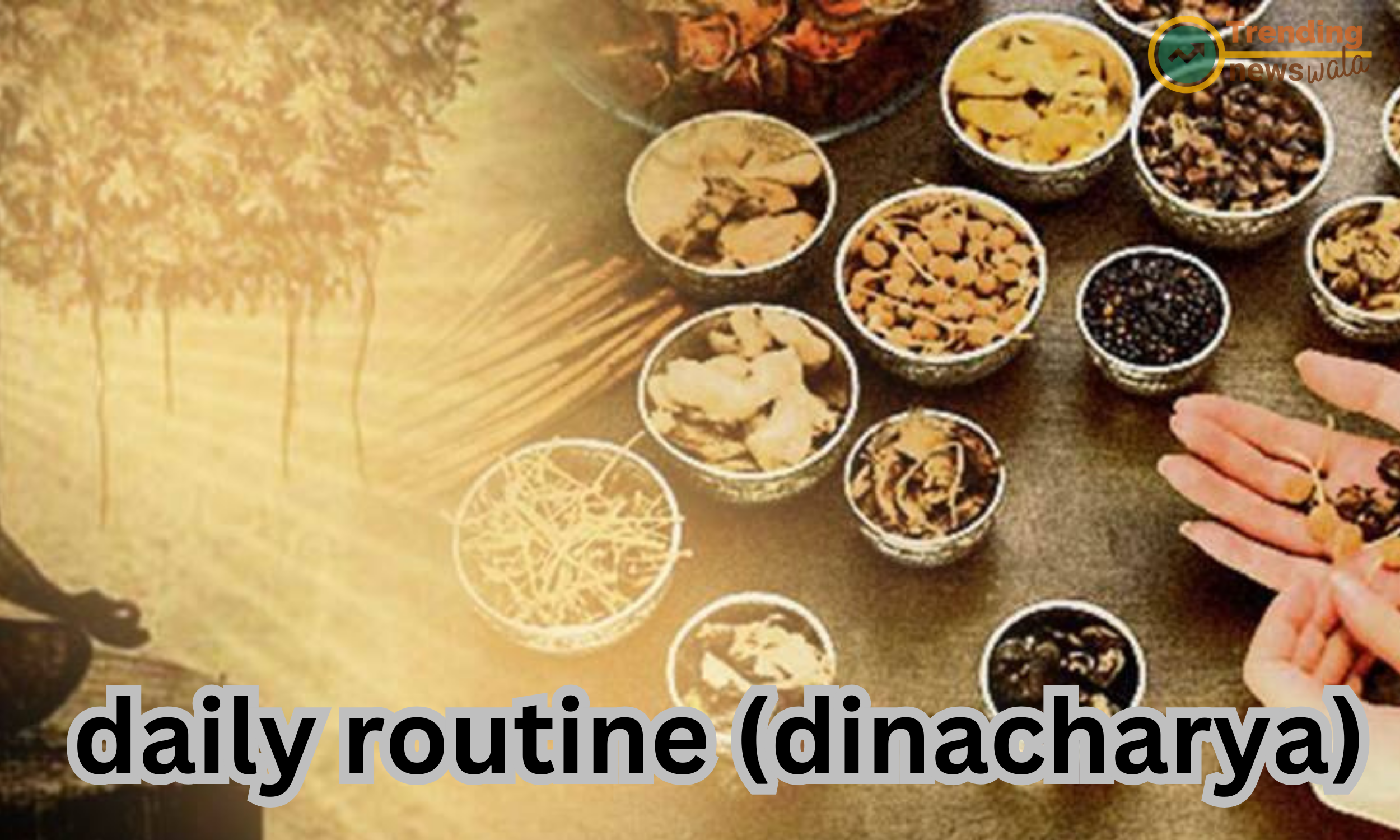Weight Management Through Ayurveda
The Ayurvedic Treatment Procedure Panchakarma can be used to manage weight loss and gain. This complete therapy detoxifies and revitalises the body combines the doshas, and promotes overall well-being, making it an effective weight-management tool.

Ayurveda, the traditional system of medicine in India, offers holistic approaches to weight management that focus on balance and overall well-being. Ayurveda views each individual as unique, and the approach to weight management is personalized based on a person's constitution, or "dosha." Here are some key principles and practices for weight management through Ayurveda:
Understand Your Dosha

In Ayurveda, understanding your dosha is a fundamental step in tailoring your lifestyle, diet, and health practices to promote overall well-being. Doshas are biological energies or principles that govern various physiological and psychological functions in the body. There are three primary doshas: Vata, Pitta, and Kapha. Each person typically has a dominant dosha or a combination of two doshas that characterizes their constitution. Here's a brief overview of each dosha:
Vata Dosha:
- Characteristics: Vata is associated with qualities like light, dry, cold, rough, and mobile. Vata individuals tend to be creative, energetic, and quick-thinking.
- Imbalance: An excess of Vata can lead to anxiety, restlessness, and digestive issues.
Pitta Dosha:
- Characteristics: Pitta is associated with qualities like hot, sharp, and intense. Pitta individuals are often sharp-minded, focused, and goal-oriented.
- Imbalance: Excess Pitta can lead to irritability, inflammation, and digestive problems.
Kapha Dosha:
- Characteristics: Kapha is associated with qualities like heavy, stable, cold, and moist. Kapha individuals are often calm, nurturing, and strong.
- Imbalance: An excess of Kapha can result in sluggishness, weight gain, and respiratory issues.
To understand your dosha and constitution, consider consulting with an Ayurvedic practitioner who can perform a detailed assessment. However, you can also get a general idea of your dominant dosha through self-assessment. Here are some common characteristics and body types associated with each dosha:
Vata Dominant:
- Physical characteristics: Thin, wiry frame; dry skin; prominent joints.
- Mental traits: Creative, active, quick to learn but forgetful.
- Tendencies: Prone to anxiety, restlessness, and digestive issues.
Pitta Dominant:
- Physical characteristics: Moderate build; fair or reddish skin; warm body temperature.
- Mental traits: Sharp intellect, leadership qualities, organized.
- Tendencies: Prone to irritability, inflammatory conditions, and digestive problems.
Kapha Dominant:
- Physical characteristics: Stocky build; smooth, moist skin; strong and steady.
- Mental traits: Calm, patient, compassionate, and methodical.
- Tendencies: Prone to sluggishness, weight gain, and respiratory issues.
Keep in mind that most people are not purely one dosha; they have a combination of doshas, with one usually being dominant. Ayurveda's approach to health and well-being involves balancing your dosha(s) through diet, lifestyle, and other practices. An Ayurvedic practitioner can help you create a personalized plan to maintain or restore balance in your body and mind. Understanding your dosha is a valuable step toward achieving optimal health and well-being according to Ayurveda.
Balanced Diet

A balanced diet is essential for maintaining good health and well-being. It provides the body with the necessary nutrients, vitamins, minerals, and energy to function optimally. A well-balanced diet typically includes a variety of foods from different food groups to ensure a broad spectrum of nutrients. Here are the key components of a balanced diet:
- Fruits and Vegetables: These should make up a significant portion of your daily intake. They are rich in vitamins, minerals, antioxidants, and dietary fiber. Aim for a variety of colorful fruits and vegetables to maximize nutrient intake.
- Proteins: Include lean sources of protein in your diet, such as poultry, fish, lean cuts of meat, tofu, legumes (beans and lentils), and low-fat dairy products. Protein is essential for muscle health and overall bodily functions.
- Whole Grains: Choose whole grains like brown rice, whole wheat bread, quinoa, and oats over refined grains. Whole grains are rich in fiber and provide sustained energy.
- Dairy or Dairy Alternatives: Include low-fat or non-fat dairy products or dairy alternatives like almond or soy milk to meet your calcium and vitamin D needs.
- Healthy Fats: Incorporate sources of healthy fats, such as avocados, nuts, seeds, olive oil, and fatty fish like salmon. Limit saturated and trans fats found in fried and processed foods.
- Portion Control: Be mindful of portion sizes to avoid overeating and maintain a healthy weight. Use smaller plates and bowls to help with portion control.
- Hydration: Drink plenty of water throughout the day to stay hydrated. Herbal teas and infusions can also contribute to hydration.
- Limit Sugars and Salt: Minimize added sugars in your diet and be cautious with high-sodium foods. Check nutrition labels for hidden sugars and salt.
- Variety: Rotate your food choices to ensure you receive a wide range of nutrients. Eating the same foods regularly may result in nutrient deficiencies.
- Moderation: Enjoy treats and indulgences in moderation. You don't need to eliminate your favorite foods, but consume them sparingly.
- Meal Planning: Plan your meals to ensure a balanced diet. Incorporate a mix of food groups into each meal.
- Fiber: Include foods high in fiber, such as whole grains, fruits, and vegetables, to support digestion and promote a feeling of fullness.
- Probiotics: Consume foods with probiotics like yogurt or sauerkraut to promote gut health.
- Herbal Teas: Herbal teas like ginger tea or cumin-coriander-fennel tea can aid digestion and metabolism.
A balanced diet not only supports physical health but also helps with mental and emotional well-being. It provides the body with the essential nutrients needed for growth, maintenance, and energy. To create a balanced diet that suits your individual needs, it's advisable to consult with a registered dietitian or nutrition expert, especially if you have specific dietary requirements or health concerns.
Mindful Eating

Mindful eating is a practice that encourages a more conscious and intentional approach to consuming food. It involves paying full attention to the eating experience, from choosing what to eat to savoring each bite, and being fully present during meals. The goal of mindful eating is to foster a healthier relationship with food, reduce overeating, and enhance overall well-being. Here are some key principles and tips for practicing mindful eating:
1. Slow Down: Eat slowly and savor each bite. Avoid rushing through meals. Take your time to enjoy the flavors and textures of the food.
2. Pay Attention: Focus on the sensory experience of eating. Notice the colors, smells, and tastes of your food. Be fully present in the moment.
3. Remove Distractions: Minimize distractions like television, smartphones, or work-related tasks during meals. Create a calm and quiet eating environment.
4. Listen to Your Body: Pay attention to your body's hunger and fullness cues. Eat when you're hungry and stop when you're satisfied, not overly full.
5. Portion Control: Be mindful of portion sizes. Use smaller plates and bowls to help with portion control. This can prevent overeating.
6. Non-Judgment: Avoid self-criticism or judgment related to food choices. Instead, approach food with kindness and self-compassion.
7. Mindful Shopping: Make conscious and healthy choices when grocery shopping. Buy fresh, whole foods and ingredients for balanced meals.
8. Mindful Preparation: Engage in the process of cooking or preparing your food. Be aware of the ingredients and cooking methods.
9. Chew Thoroughly: Chew your food thoroughly. Chewing aids digestion and allows you to taste and enjoy the flavors more fully.
10. Mindful Snacking: If you snack, do so mindfully. Choose healthy, whole foods for snacks, and pay attention to your body's hunger cues.
11. Emotional Eating: Be mindful of emotional eating. Recognize when you are eating in response to emotions rather than hunger.
12. Gratitude: Express gratitude for your food. Consider the effort that went into producing and preparing your meals.
13. Record Your Food: Keeping a food journal or diary can help increase awareness of your eating habits.
14. Be Patient: Mindful eating is a skill that takes time to develop. Be patient with yourself as you cultivate this practice.
15. Seek Support: Consider mindfulness or mindful eating programs or support groups to help you develop and maintain this practice.
Practicing mindful eating can promote a healthier relationship with food, prevent overeating, and reduce stress related to eating. It can also help you make more conscious and nutritious food choices. As you become more attuned to your body's cues and the experience of eating, you're likely to enjoy your meals more and feel more in control of your eating habits.
Regular Meal Times

Establishing regular meal times is an important aspect of maintaining a balanced and healthy diet. Consistency in meal timing helps regulate your body's internal clock, supports digestion, and provides a structured approach to eating. Here are the benefits of adhering to regular meal times:
- Regulates Hunger: When you eat at consistent times each day, your body becomes accustomed to the routine, and you're less likely to experience extreme hunger or energy crashes between meals.
- Balanced Blood Sugar Levels: Regular meals help stabilize blood sugar levels, reducing the risk of sudden spikes or drops in glucose. This can aid in preventing cravings for unhealthy, sugary snacks.
- Supports Digestion: Your body prepares for digestion when it anticipates mealtime. Eating at regular intervals allows your digestive system to function efficiently.
- Better Nutrient Absorption: Consistent meal timing enhances the absorption of nutrients from your food, ensuring that your body gets the most benefit from what you eat.
- Enhances Metabolism: Regular meal times support a healthy metabolism by providing a steady source of energy throughout the day.
- Improves Energy Levels: You'll experience sustained energy levels when you eat at regular intervals, making you more alert and focused.
To establish and maintain regular meal times, consider the following tips:
- Create a Schedule: Plan your meals around a daily schedule, with specific times for breakfast, lunch, dinner, and any snacks. Consistency is key.
- Listen to Your Body: Pay attention to your body's hunger cues and eat when you feel moderately hungry. Avoid waiting until you're extremely hungry, as this can lead to overeating.
- Avoid Skipping Meals: Skipping meals can disrupt your routine and lead to overcompensating later in the day. Make an effort to eat every meal.
- Set Alarms or Reminders: Use alarms or reminders on your phone or clock to signal meal times until it becomes a habit.
- Pack Snacks: If you're unable to have a full meal at a particular time, prepare healthy snacks like fruit, nuts, or yogurt to maintain your energy levels.
- Stay Hydrated: Drinking water throughout the day helps curb your appetite and keeps you hydrated. However, avoid excessive fluid intake right before meals, as it can disrupt digestion.
- Be Flexible: While routine is important, it's also essential to be flexible. Sometimes unexpected events may affect your meal timing. In such cases, return to your schedule when possible.
- Plan Ahead: Prepare meals and snacks in advance, so you're less likely to skip or delay meals due to lack of time or options.
Remember that meal timing should align with your lifestyle and individual preferences. What works best for one person might not work for another. Regular meal times contribute to a more structured and balanced approach to eating, ultimately promoting better health and well-being.
Herbal Supplements

Herbal supplements are products made from plant extracts or plant-derived substances and are often used for their potential health benefits. They have been used for centuries in traditional medicine systems, such as Ayurveda, Traditional Chinese Medicine, and Native American healing practices. Here's an overview of herbal supplements, their potential benefits, and considerations:
Types of Herbal Supplements:
- Single Herbs: These supplements contain a single plant extract, such as garlic, ginseng, or echinacea.
- Herbal Combinations: These supplements combine multiple plant extracts to achieve specific health goals, like immunity support or stress relief.
- Herbal Teas: Herbal teas are made by steeping dried herbs or plant parts in hot water. They are consumed as a beverage and are known for their soothing and therapeutic properties.
- Herbal Tinctures: Tinctures are liquid extracts of herbs, often preserved in alcohol or glycerin. They are usually taken in small, diluted amounts.
- Herbal Capsules and Tablets: These are convenient forms of herbal supplements for those who prefer a pill format.
Potential Benefits of Herbal Supplements:
- Supporting Health: Herbal supplements are often used to support general health and well-being. For example, ginseng is believed to boost energy, while ginger may help with digestion.
- Treating Specific Conditions: Some herbal supplements are used to address particular health issues, such as using St. John's Wort for mild depression or saw palmetto for prostate health.
- Holistic Healing: Herbal remedies are often used in holistic and alternative medicine practices, which emphasize natural healing and balance within the body.
- Traditional Medicine: Many cultures have used herbal remedies for generations, passing down knowledge of their healing properties.
Considerations for Using Herbal Supplements:
- Consult a Healthcare Professional: Before starting any herbal supplement, consult with a qualified healthcare provider, especially if you have underlying health conditions, take prescription medications, or are pregnant or nursing.
- Quality and Safety: Ensure that the herbal supplements you choose are of high quality and come from reputable sources. Look for products that have been tested for purity and potency.
- Dosage: Follow the recommended dosage instructions on the product label or as advised by a healthcare professional. Taking excessive amounts can lead to adverse effects.
- Potential Interactions: Be aware of potential interactions between herbal supplements and medications you may be taking. Some herbs can interact with prescription drugs, affecting their effectiveness.
- Side Effects: Like any substance, herbal supplements can have side effects or allergic reactions. It's important to be aware of these and stop use if you experience any adverse effects.
- Individual Response: People may respond differently to herbal supplements. What works for one person may not work the same way for another, so be patient and open to adjustments.
- Regulations: Regulations on herbal supplements can vary by country. It's essential to be aware of the regulatory environment in your region and choose products that meet established quality and safety standards.
Herbal supplements can be a valuable addition to a healthy lifestyle and wellness routine, but they should be used with knowledge and care. Consulting a healthcare professional is advisable to ensure that herbal supplements are suitable for your individual health needs and circumstances.
Daily Routine (Dinacharya)

Dinacharya, often referred to as the daily routine in Ayurveda, is a set of practices and rituals that are designed to promote overall well-being and harmony with nature. It is based on the principles of Ayurveda, a traditional system of medicine from India. The daily routine is considered essential for maintaining physical, mental, and spiritual balance. Here is a general outline of a traditional Ayurvedic daily routine:
1. Wake Up Early: Ayurveda suggests waking up during the "Brahma muhurta," which is approximately 1.5 hours before sunrise. This is considered the most auspicious and spiritually charged time of the day.
2. Oral Care: Start your day with oral hygiene practices like tongue scraping and oil pulling. These help remove toxins from the mouth and improve oral health.
3. Hydration: Drink a glass of warm water to kickstart your digestive system and rehydrate your body.
4. Elimination: Attend to your natural calls (urination and bowel movement) as soon as you wake up.
5. Abhyanga (Self-Massage): Apply warm oil to your body, known as abhyanga. The type of oil used can be chosen based on your dosha or personal preference. This practice nourishes the skin, calms the nervous system, and enhances circulation.
6. Bathing: Take a warm bath or shower to cleanse the body and mind.
7. Yoga and Meditation: Engage in yoga and meditation practices to connect with your body and mind, and set a positive intention for the day. The specific practices may vary depending on your dosha and personal goals.
8. Pranayama (Breathing Exercises): Practice pranayama to enhance the flow of life force energy (prana) in the body. This can help improve concentration and calm the mind.
9. Breakfast: Enjoy a nourishing and balanced breakfast that aligns with your dosha and dietary preferences. It's important to eat mindfully and savor each bite.
10. Work and Daily Activities: Continue with your daily work and activities, but strive to maintain a sense of mindfulness and presence throughout the day.
11. Lunch: Have a midday meal that includes a balance of all six tastes: sweet, sour, salty, bitter, pungent, and astringent. This supports digestion and overall health.
12. Rest and Digest: Ayurveda recommends taking a short break, or even a 15-20 minute nap, to allow the body to rest and aid digestion.
13. Evening Activities: After work, engage in activities that promote relaxation and inner peace. This can include a leisurely walk, spending time in nature, or practicing yoga and meditation.
14. Dinner: Have a light and early dinner to allow for proper digestion before bedtime. Avoid heavy, greasy, or spicy foods in the evening.
15. Wind Down: As you approach bedtime, create a calming bedtime routine. Avoid stimulating activities like intense TV shows or work.
16. Sleep: Aim to go to bed early to ensure you get sufficient rest. Adequate sleep is essential for overall health and well-being.
Keep in mind that your individual daily routine may vary based on your dosha and personal preferences. Ayurveda emphasizes the importance of creating a routine that supports your unique constitution and goals. To implement a personalized Dinacharya, it's helpful to consult with an Ayurvedic practitioner who can provide guidance and recommendations tailored to your specific needs.
Physical Activity

Physical activity is a crucial component of a healthy lifestyle that offers a wide range of physical, mental, and emotional benefits. Regular physical activity can improve overall well-being and reduce the risk of chronic diseases. Here are some key aspects of physical activity:
Types of Physical Activity:
- Aerobic Exercise: Aerobic activities increase your heart rate and breathing. These include activities like walking, running, cycling, swimming, and dancing. Aerobic exercise improves cardiovascular health, endurance, and helps with weight management.
- Strength Training: Strength training involves exercises that target your muscles. It can be done with free weights, resistance bands, or exercise machines. Strength training helps build muscle, increase metabolism, and improve bone health.
- Flexibility and Stretching: Flexibility exercises improve the range of motion in your joints and can help prevent injury. Yoga and stretching routines are good examples.
- Balance and Coordination: These exercises, like tai chi or certain yoga poses, improve stability and coordination, reducing the risk of falls, especially in older adults.
Benefits of Physical Activity:
- Improved Physical Health: Regular physical activity can reduce the risk of chronic diseases, including heart disease, diabetes, and certain types of cancer. It can also help manage and prevent obesity.
- Mental Health: Physical activity is associated with improved mood and reduced symptoms of depression and anxiety. It can boost the release of endorphins, which are natural mood lifters.
- Weight Management: Physical activity helps with weight control by burning calories and increasing metabolism.
- Bone Health: Weight-bearing exercises (such as walking and running) help maintain bone density and reduce the risk of osteoporosis.
- Better Sleep: Regular physical activity can improve the quality of your sleep.
- Increased Energy: It can boost your energy levels, making you feel more alert and less fatigued.
- Improved Cognitive Function: Exercise has been shown to enhance cognitive function, including memory and problem-solving skills.
- Social Engagement: Participating in group fitness classes or team sports provides opportunities for social interaction and community building.
Guidelines for Physical Activity:
The American Heart Association and other health organizations recommend the following guidelines for physical activity:
- Aerobic Exercise: Aim for at least 150 minutes of moderate-intensity aerobic exercise (like brisk walking) or 75 minutes of vigorous-intensity aerobic exercise (like running) per week, or a combination of both.
- Strength Training: Incorporate strength training exercises for all major muscle groups on at least two days a week.
- Flexibility and Balance: Include flexibility and balance exercises as part of your routine, especially if you're older or have specific goals related to these areas.
It's important to choose physical activities that you enjoy, as this increases the likelihood that you'll stick with them over the long term. Additionally, it's advisable to consult with a healthcare provider, especially if you have any underlying health conditions, before starting a new exercise program. Remember that the key is to find a balance and consistency in your physical activity that aligns with your personal goals and preferences.
Detoxification

Detoxification, often referred to as "detox," is the process of removing or neutralizing toxins from the body to promote overall health and well-being. While the human body has its own natural detoxification mechanisms, some people opt for detox programs or practices to support these processes. Here's an overview of detoxification and how it can be achieved in a healthy and balanced manner:
1. Body's Natural Detox Mechanisms:The human body has built-in detoxification mechanisms, primarily involving the liver, kidneys, digestive system, and skin. These organs work to eliminate waste products and toxins from the body. Supporting these natural processes is essential for maintaining health.
2. Detox Methods:There are various methods and practices associated with detoxification. Some common approaches include:
- Dietary Detox: This involves making dietary changes to eliminate processed foods, sugar, caffeine, and alcohol while increasing the consumption of fruits, vegetables, and water.
- Fasting: Short-term fasting or intermittent fasting is sometimes used as a detox method. It can involve abstaining from food or certain types of food for a specified period.
- Colon Cleansing: Some people opt for colon cleansing or colonics to remove waste and toxins from the colon. However, this is a controversial practice and should be approached with caution.
- Detox Diets and Supplements: Various detox diets and supplements are marketed as ways to support detoxification. These can include herbal teas, fiber supplements, or detox "kits."
3. Importance of a Balanced Approach:It's crucial to approach detoxification with a balanced and well-informed perspective. Detox programs can vary widely in their safety and effectiveness. Here are some key considerations:
- Consult a Healthcare Professional: Before embarking on any detox program, it's advisable to consult with a healthcare provider. They can help you determine if detox is appropriate for you and provide guidance on safe practices.
- Be Skeptical of Extreme Methods: Extreme detox methods or prolonged fasting can lead to nutrient deficiencies, muscle loss, and other health issues. It's important to maintain a balanced intake of essential nutrients.
- Stay Hydrated: Adequate hydration is essential during any detox program to support the body's natural detox mechanisms and prevent dehydration.
- Consider Whole Foods: If you're looking to support your body's natural detoxification processes, focus on eating a balanced diet rich in whole foods, particularly fruits and vegetables. These provide essential nutrients, antioxidants, and dietary fiber that support detox.
4. Lifestyle and Habit Changes:Rather than adopting extreme detox methods, consider making long-term lifestyle changes that support your body's natural detoxification mechanisms:
- Healthy Diet: Consume a diet rich in whole foods, fiber, and antioxidants. Limit processed foods, added sugars, and alcohol.
- Stay Hydrated: Drink plenty of water throughout the day.
- Physical Activity: Engage in regular physical activity to support circulation and overall health.
- Adequate Sleep: Ensure you get sufficient restorative sleep, which is essential for the body's natural detox processes.
It's important to remember that detoxification is a continuous, ongoing process, not a one-time event. Your body is equipped to handle toxins on a daily basis. By making healthy lifestyle choices, you can support and enhance your body's natural detoxification mechanisms, promoting long-term well-being. If you have specific health concerns or are considering a detox program, consult with a healthcare provider for guidance tailored to your individual needs.
Stress Management

Effective stress management is crucial for maintaining both your mental and physical health. In today's fast-paced world, stress is a common part of life, but how you respond to and manage stress can significantly impact your well-being. Here are some practical strategies for managing stress:
1. Identify Stressors: Recognize the sources of stress in your life. These may include work, relationships, financial issues, or health concerns.
2. Maintain a Supportive Network: Reach out to friends and family for emotional support. Talking about your stressors with someone you trust can be a significant stress reliever.
3. Set Realistic Goals: Be realistic about what you can achieve in a given day or week. Setting unattainable goals can lead to unnecessary stress.
4. Time Management: Organize your time effectively. Prioritize your tasks and break them into manageable steps. Use tools like to-do lists and calendars to stay organized.
5. Deep Breathing and Relaxation Techniques: Practice deep breathing exercises or progressive muscle relaxation to calm your body's stress response.
6. Physical Activity: Regular physical activity is a powerful stress reducer. Exercise releases endorphins, which are natural mood lifters.
7. Healthy Diet: Eat a well-balanced diet that includes a variety of fruits, vegetables, whole grains, and lean proteins. Nutrient-rich foods can support your body in times of stress.
8. Sleep: Prioritize sleep by aiming for 7-9 hours per night. Quality sleep is essential for managing stress and maintaining good mental health.
9. Mindfulness and Meditation: Practice mindfulness meditation, which involves focusing on the present moment without judgment. Meditation can help you manage stress and enhance mental clarity.
10. Seek Professional Help: If you're finding it challenging to manage stress on your own, consider seeking the help of a mental health professional, such as a therapist or counselor.
11. Set Boundaries: Establish boundaries to protect your time and energy. Learn to say no to additional commitments when you're already feeling overwhelmed.
12. Laughter and Leisure: Engage in activities that make you laugh and bring you joy. Laughter is a natural stress reliever. Leisure activities can provide a much-needed break from stress.
13. Stay Informed: Sometimes, stress can be caused by uncertainty or a lack of information. Staying informed about the issues or situations causing stress can help alleviate it.
14. Avoid Self-Medication: Avoid relying on alcohol, tobacco, or other substances to cope with stress. These can worsen the situation and have negative effects on your health.
15. Positive Self-Talk: Challenge negative thoughts and replace them with positive and constructive self-talk. Encourage and motivate yourself.
Remember that stress management is a highly individual process. What works for one person may not work for another, so it's essential to find the strategies that are most effective for you. Additionally, managing stress is an ongoing practice. By incorporating these strategies into your daily life, you can build resilience and improve your ability to cope with life's challenges. If you find that stress is significantly impacting your life or mental health, consider seeking professional guidance.
Herbal Teas

Herbal teas, also known as tisanes, are beverages made by infusing various plant materials, such as leaves, flowers, seeds, roots, or stems, in hot water. These teas are often enjoyed for their flavors and potential health benefits. Here are some popular herbal teas, along with their potential benefits:
1. Chamomile Tea:
- Benefits: Chamomile tea is known for its calming and soothing properties. It may help with sleep, relaxation, and digestive discomfort.
- Flavor: Mild and slightly sweet.
2. Peppermint Tea:
- Benefits: Peppermint tea is known for its digestive benefits. It can help relieve indigestion, bloating, and nausea. It also has a refreshing taste.
- Flavor: Minty and cooling.
3. Ginger Tea:
- Benefits: Ginger tea is believed to aid digestion, reduce nausea, and alleviate symptoms of colds and flu. It has anti-inflammatory properties.
- Flavor: Spicy and slightly sweet.
4. Lemon Balm Tea:
- Benefits: Lemon balm tea is often used for its calming effects. It may help reduce stress and anxiety. It has a pleasant lemony flavor.
- Flavor: Citrusy and light.
5. Lavender Tea:
- Benefits: Lavender tea is known for its relaxing and soothing properties. It may help with anxiety and insomnia.
- Flavor: Floral and aromatic.
6. Echinacea Tea:
- Benefits: Echinacea tea is often consumed to boost the immune system and reduce the severity of colds and respiratory infections.
- Flavor: Mildly earthy and slightly sweet.
7. Hibiscus Tea:
- Benefits: Hibiscus tea is rich in antioxidants and may help lower blood pressure. It has a bright red color and a tart, fruity flavor.
- Flavor: Tart and tangy.
8. Valerian Root Tea:
- Benefits: Valerian root tea is used for its potential to improve sleep quality and relieve insomnia. It has a strong, earthy flavor.
- Flavor: Earthy and somewhat bitter.
9. Rooibos Tea:
- Benefits: Rooibos is caffeine-free and rich in antioxidants. It's known for its potential to support heart health and digestion.
- Flavor: Mild, slightly nutty, and naturally sweet.
10. Dandelion Root Tea:- Benefits: Dandelion root tea may support liver health and digestion. It's caffeine-free and has a roasted, nutty flavor. - Flavor: Roasted and slightly bitter.
11. Nettle Tea:- Benefits: Nettle tea is rich in vitamins and minerals and is used for its potential to alleviate allergies and support overall health. - Flavor: Earthy and slightly grassy.
12. Rosehip Tea:- Benefits: Rosehip tea is packed with vitamin C and antioxidants. It may support the immune system and skin health. - Flavor: Fruity and slightly tart.
13. Cinnamon Tea:- Benefits: Cinnamon tea is believed to help regulate blood sugar and provide antioxidant benefits. It has a warm and spicy flavor. - Flavor: Spicy and sweet.
When preparing herbal teas, it's essential to use fresh or dried plant materials and steep them in hot water for a few minutes, typically 5-10 minutes, although steeping times can vary depending on the specific tea and your preference. Enjoying a cup of herbal tea can be a relaxing and enjoyable way to incorporate the potential benefits of these natural ingredients into your daily routine.
Consult an Ayurvedic Practitioner

Consulting an Ayurvedic practitioner is a valuable step if you are interested in Ayurveda, a traditional system of medicine from India that focuses on holistic well-being. Ayurvedic practitioners can provide personalized guidance and recommendations based on your unique constitution (dosha) and health goals.
It's important to note that Ayurveda is a holistic system that takes time to yield results. Weight loss or maintenance through Ayurveda is not about quick fixes but about creating balance in the body and mind. Always consult with a qualified Ayurvedic practitioner or healthcare provider before making significant changes to your diet or lifestyle, especially if you have existing health conditions. Ayurveda can complement modern healthcare but should not be considered a sole treatment for certain medical conditions.





